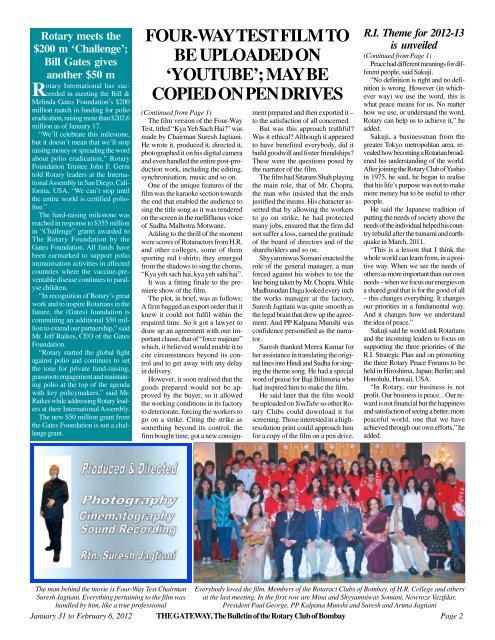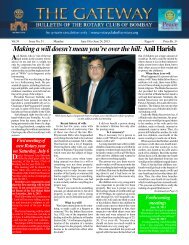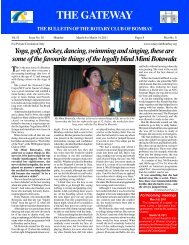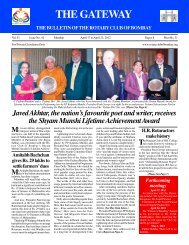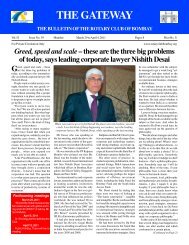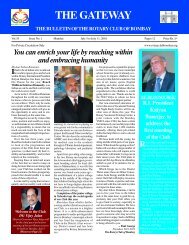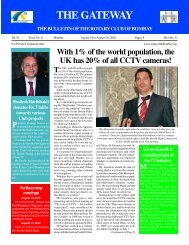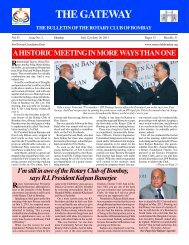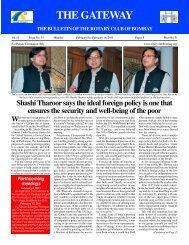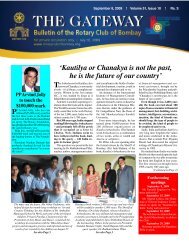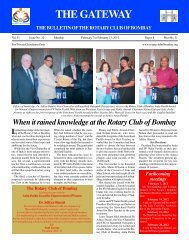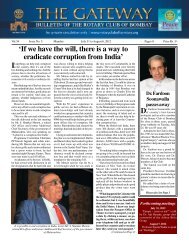Gateway 310112.pmd - Rotary Club of Bombay
Gateway 310112.pmd - Rotary Club of Bombay
Gateway 310112.pmd - Rotary Club of Bombay
- No tags were found...
Create successful ePaper yourself
Turn your PDF publications into a flip-book with our unique Google optimized e-Paper software.
<strong>Rotary</strong> meets the$200 m ‘Challenge’;Bill Gates givesanother $50 m<strong>Rotary</strong> International has succeededin meeting the Bill &Melinda Gates Foundation’s $200million match in funding for polioeradication, raising more than $202.6million as <strong>of</strong> January 17.“We’ll celebrate this milestone,but it doesn’t mean that we’ll stopraising money or spreading the wordabout polio eradication,” <strong>Rotary</strong>Foundation Trustee John F. Germtold <strong>Rotary</strong> leaders at the InternationalAssembly in San Diego, California,USA. “We can’t stop untilthe entire world is certified poli<strong>of</strong>ree.”The fund-raising milestone wasreached in response to $355 millionin “Challenge” grants awarded toThe <strong>Rotary</strong> Foundation by theGates Foundation. All funds havebeen earmarked to support polioimmunisation activities in affectedcountries where the vaccine-preventabledisease continues to paralysechildren.“In recognition <strong>of</strong> <strong>Rotary</strong>’s greatwork and to inspire Rotarians in thefuture, the (Gates) foundation iscommitting an additional $50 millionto extend our partnership,” saidMr. Jeff Raikes, CEO <strong>of</strong> the GatesFoundation.“<strong>Rotary</strong> started the global fightagainst polio and continues to setthe tone for private fund-raising,grassroots engagement and maintainingpolio at the top <strong>of</strong> the agendawith key policymakers,” said Mr.Raikes while addressing <strong>Rotary</strong> leadersat their International Assembly.The new $50 million grant fromthe Gates Foundation is not a challengegrant.FOUR-WAY TEST FILM TOBE UPLOADED ON‘YOUTUBE’; MAY BECOPIED ON PEN DRIVES(Continued from Page 1)The film version <strong>of</strong> the Four-WayTest, titled “Kya Yeh Sach Hai?” wasmade by Chairman Suresh Jagtiani.He wrote it, produced it, directed it,photographed it on his digital cameraand even handled the entire post-productionwork, including the editing,synchronisation, music and so on.One <strong>of</strong> the unique features <strong>of</strong> thefilm was the karaoke section towardsthe end that enabled the audience tosing the title song as it was renderedon the screen in the mellifluous voice<strong>of</strong> Sudha Malhotra Motwane.Adding to the thrill <strong>of</strong> the momentwere scores <strong>of</strong> Rotaractors from H.R.and other colleges, some <strong>of</strong> themsporting red t-shirts; they emergedfrom the shadows to sing the chorus,“Kya yeh sach hai, kya yeh sahi hai”.It was a fitting finale to the premiereshow <strong>of</strong> the film.The plot, in brief, was as follows:A firm bagged an export order that itknew it could not fulfil within therequired time. So it got a lawyer todraw up an agreement with one importantclause, that <strong>of</strong> “force majeure”which, it believed would enable it tocite circumstances beyond its controland to get away with any delayin delivery.However, it soon realised that thegoods prepared would not be approvedby the buyer, so it allowedthe working conditions in its factoryto deteriorate, forcing the workers togo on a strike. Citing the strike assomething beyond its control, thefirm bought time, got a new consignmentprepared and then exported it –to the satisfaction <strong>of</strong> all concerned.But was this approach truthful?Was it ethical? Although it appearedto have benefited everybody, did itbuild goodwill and foster friendships?These were the questions posed bythe narrator <strong>of</strong> the film.The film had Sitaram Shah playingthe main role, that <strong>of</strong> Mr. Chopra,the man who insisted that the endsjustified the means. His character assertedthat by allowing the workersto go on strike, he had protectedmany jobs, ensured that the firm didnot suffer a loss, earned the gratitude<strong>of</strong> the board <strong>of</strong> directors and <strong>of</strong> theshareholders and so on.Shyyamniwas Somani enacted therole <strong>of</strong> the general manager, a manforced against his wishes to toe theline being taken by Mr. Chopra. WhileMadhusudan Daga looked every inchthe works manager at the factory,Suresh Jagtiani was quite smooth asthe legal brain that drew up the agreement.And PP Kalpana Munshi wasconfidence personified as the narrator.Suresh thanked Meera Kumar forher assistance in translating the originallines into Hindi and Sudha for singingthe theme song. He had a specialword <strong>of</strong> praise for Baji Bilimoria whohad inspired him to make the film.He said later that the film wouldbe uploaded on YouTube so other <strong>Rotary</strong><strong>Club</strong>s could download it forscreening. Those interested in a highresolutionprint could approach himfor a copy <strong>of</strong> the film on a pen drive.R.I. Theme for 2012-13is unveiled(Continued from Page 1)Peace had different meanings for differentpeople, said Sakuji.“No definition is right and no definitionis wrong. However (in whicheverway) we use the word, this iswhat peace means for us. No matterhow we use, or understand the word,<strong>Rotary</strong> can help us to achieve it,” headded.Sakuji, a businessman from thegreater Tokyo metropolitan area, revealedhow becoming a Rotarian broadenedhis understanding <strong>of</strong> the world.After joining the <strong>Rotary</strong> <strong>Club</strong> <strong>of</strong> Yashioin 1975, he said, he began to realisethat his life’s purpose was not to makemore money but to be useful to otherpeople.He said the Japanese tradition <strong>of</strong>putting the needs <strong>of</strong> society above theneeds <strong>of</strong> the individual helped his countryrebuild after the tsunami and earthquakein March, 2011.“This is a lesson that I think thewhole world can learn from, in a positiveway. When we see the needs <strong>of</strong>others as more important than our ownneeds – when we focus our energies ona shared goal that is for the good <strong>of</strong> all– this changes everything. It changesour priorities in a fundamental way.And it changes how we understandthe idea <strong>of</strong> peace.”Sakuji said he would ask Rotariansand the incoming leaders to focus onsupporting the three priorities <strong>of</strong> theR.I. Strategic Plan and on promotingthe three <strong>Rotary</strong> Peace Forums to beheld in Hiroshima, Japan; Berlin; andHonolulu, Hawaii, USA.“In <strong>Rotary</strong>, our business is notpr<strong>of</strong>it. Our business is peace... Our rewardis not financial but the happinessand satisfaction <strong>of</strong> seeing a better, morepeaceful world, one that we haveachieved through our own efforts,” headded.The man behind the movie is Four-Way Test Chairman Everybody loved the film. Members <strong>of</strong> the Rotaract <strong>Club</strong>s <strong>of</strong> <strong>Bombay</strong>, <strong>of</strong> H.R. College and othersSuresh Jagtiani. Everything pertaining to the film was at the last meeting. In the first row are Mina and Shyyamniwas Somani, Nowroze Vazifdar,handled by him, like a true pr<strong>of</strong>essionalPresident Paul George, PP Kalpana Munshi and Suresh and Aruna JagtianiJanuary 31 to February 6, 2012 THE GATEWAY, The Bulletin <strong>of</strong> the <strong>Rotary</strong> <strong>Club</strong> <strong>of</strong> <strong>Bombay</strong> Page 2


